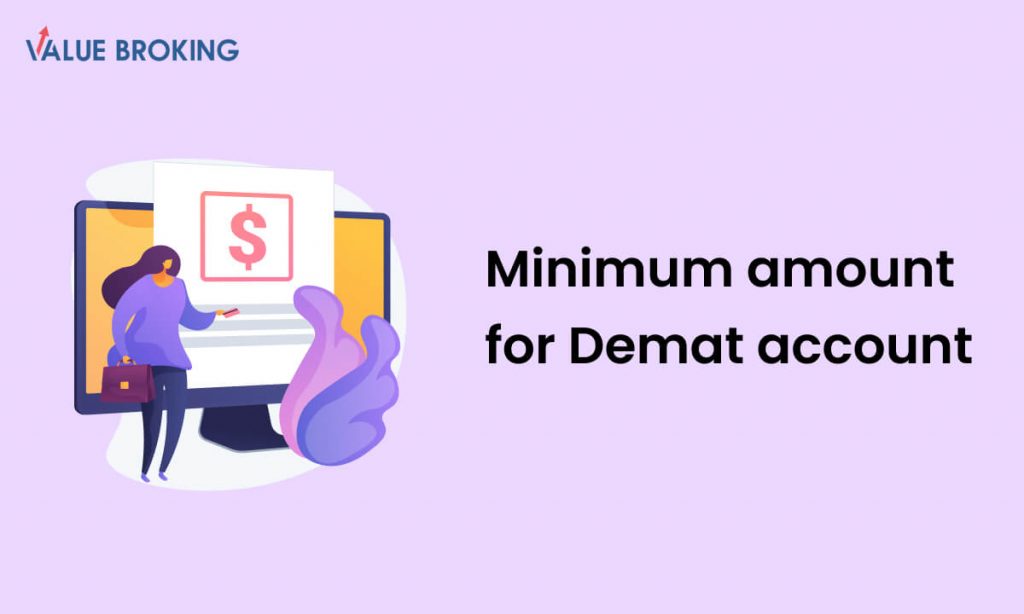What is the Minimum Amount for a Demat account?

A Demat account is an essential part of the Indian stock market. With the stock market shifting online, it is a wise choice to open a Demat account online. This is because unlike in older times when an investor had to pay a certain amount to their DP to open an account. Now, you can open a Demat account for free with the assistance of a reliable DP. This accessibility and affordability have encouraged many beginners to begin investing in the stock market. However, one of the important things you need to know about a Demat account is the minimum account balance to maintain. So let’s understand about the same in detail.
Key Highlights
- Depending on the Depository Participant (DP), opening a Demat account could be free or require a minimal amount as its minimum balance differs from one DP to another.
- Maintaining a minimum balance in a Demat account isn’t compulsory. This is because, rather than capital, the account holds your shares and securities.
- If a Demat account is inactive for more than a year, it may get a closure notification or an annual charge may be levied by the broker.
- Choosing a suitable DP means comparing prices and assists. One must assess the price with the DP’s past performance before a choice is made.
Table of Contents
Is It Mandatory to Maintain a Demat Account Minimum Balance?
There is no such requirement to maintain a minimum balance for a Demat account. A simple explanation is that a Demat account does not have capital. Instead, it has your shares and securities that you buy from the stock market.
If you do not use or keep your financial holding for more than one year, you get an email about closing the Demat account. Depending upon the broker, your account can invite a yearly base penalty. You can close or reuse your Demat as you need.
An online Demat account is one of the safest and fastest ways to make online trades in the stock market. With these qualities of no minimum balance now, any person who wants to invest and is a newbie to the stock market can invest freely. The flexibility of the Demat account encourages more traders to invest and make their savings into better returns.
Conclusion
Always choose a depository participant who suits your investment budget and strategies. A DP plays an essential role in the fees of your Demat account. Moreover, as an independent investor, you have the freedom to compare the facilities provided by various DPs before selecting one. Therefore, check the previous performance of your DPs’ investment strategies. Make an informed decision by understanding whether the DP’s plan aligns with your goals or not.
Additionally, your DP will let you know about the minimum amount for opening a demat account and the other charges associated with it. However, if you have any queries, you can mail them to your brokerage firm’s customer service. By doing so your broker will be able to help you as soon as possible to resolve your query via email.
FAQs on Minimum Amount for Demat Account
If you open a Demat account online, you will have to pay through the available online methods. If you open a Demat account offline, you will have to pay physically as your chosen depository participant suggested.
There are many stockbrokers in India where you can open a Demat account for free. You can open it through any depository participant in India. Also, you should look out for other brokerage charges when opening a free Demat account in India.
There are two depositories in India, such as NSDL and CDSL, and you can open a Demat account on any of them through depository participants (DP) in India. Both depositories in India follow the rules and regulations set by the Securities and Exchange Board of India (SEBI). So, it doesn’t matter whether you open a Demat account for free or use money; you will get complete protection. Therefore, you just need to choose the right depository participant to open a Demat account with the minimum amount requirement.
Yes, investors have the option of opening a free Demat account. Several financial institutions do not start charging for this service or have any yearly deposits. Whereas, there may be some additional costs related to transactions, maintenance of accounts, or other services. Therefore, investors should look into the conditions specified in their contract for such matters.